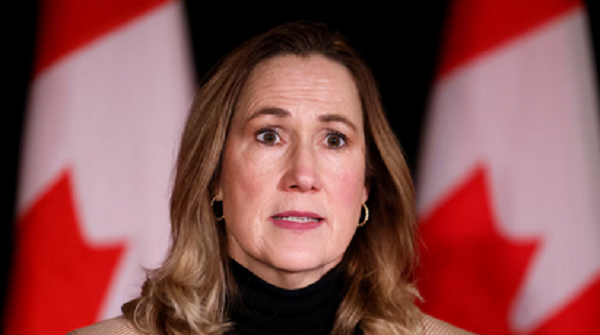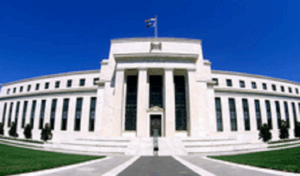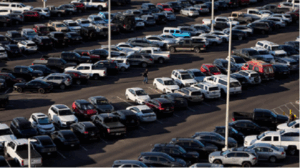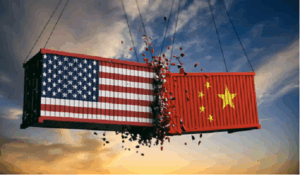‘We remain exempt from this levy’: Canada will not be subject to blanket 10-per-cent U.S. duty on most imports: envoy
The Trump administration has informed Canada that it will not be subject to a universal 10-per-cent tariff the United States says it’s imposing on most countries in place of heftier levies that are now suspended.
Kirsten Hillman, Canada’s ambassador to the United States, said she obtained the assurance from U.S. Trade Representative Jamieson Greer on Wednesday, hours after another U.S. official told reporters Canadian and Mexican imports would be subject to the tariff.
The ambassador said Mr. Greer told her “we remain exempt from this levy.”
Nevertheless, Canadian imports are still subject to a series of tariffs imposed by President Donald Trump since March, which are expected to drive up costs for U.S. consumers and hurt businesses in Canada.
The Trump administration on Wednesday reversed course on steep tariffs it recently imposed on most countries – pausing them for 90 days – and said instead a 10-per-cent levy would apply to products from U.S. trading partners while it negotiated new trade arrangements with these countries. This would not include China, White House press secretary Karoline Leavitt said, because it had retaliated with countertariffs. Instead, the U.S. tariff on China is being raised to 125 per cent.
U.S. Treasury Secretary Scott Bessent initially sowed confusion by telling reporters in Washington that Canadian and Mexican imports would also be subject to what he called the universal 10-per-cent tariff.
The current U.S. levies on Canada, which remain in effect, include 25-per-cent tariffs on Canadian steel and aluminum, as well as a 25-per-cent tariff on Canadian-made vehicles, which applies only to the non-U.S. content in those cars and light trucks. There is also a 25-per-cent tariff on most goods – which drops to 10 per cent on critical minerals, energy and potash – that has been suspended for all products that comply with United States-Mexico-Canada Agreement rules.
Liberal Leader Mark Carney in a social-media post Wednesday welcomed Washington’s decision to pause steep tariffs on most foreign trading partners, which had roiled stock markets and raised concern about a potential recession.
He noted that he and Mr. Trump had agreed on March 28 that, immediately after the April 28 election, the U.S. President and Canada’s prime minister would commence negotiations on a “new economic and security relationship.” Mr. Carney said the coming trade talks between Washington and other countries would likely mean a “fundamental restructuring of the global trading system.”
Mr. Carney said Canada must continue to deepen its relationships with other trading partners “that share our values, including the free and open exchange of goods, services, and ideas.”
The Canadian Chamber of Commerce, the country’s biggest business lobby, said Canada is still being poorly treated by the United States and lamented the fact Mr. Trump wasn’t lowering tariffs for Canada.
Matthew Holmes, an executive vice-president at the Chamber, said existing U.S. levies on products such as steel, aluminum, autos and lumber represent a tax that Americans will ultimately pay.
“These tariffs are daily blows for both economies while breaking business ties that have supported communities on both sides of the border for generations.”
Canada has historically aligned itself economically, militarily and otherwise with the Unites States, Mr. Holmes noted. But Wednesday’s “missed opportunity is another sign for Canadian businesses that we can’t rely on the U.S. any longer.”
Mr. Trump has vowed to go after pharmaceutical imports in future tariff measures and Mr. Holmes warned this could end up targeting shipments from Canada’s generic pharmaceutical industry.
A Canadian steel manufacturer Wednesday called on the federal government to do more to block Chinese steel that may be redirected to Canada after the massive tariff wall Washington imposed on goods from China. Canada already has 25-per-cent tariffs on Chinese steel and aluminum to discourage this.
“News that U.S. President Donald Trump will impose a 125 per cent tariff on products from China underscores the urgent need for the government of Canada to prevent the dumping of steel by countries like China into the Canadian market,” Canada Metal Processing Group (MPG Canada) said in a statement.
It urged Ottawa to impose surtaxes and end exemptions for steel imports. “This is the only way to protect Canada from being flooded by Chinese steel now that the country has lost significant access to the U.S. market,” MPG Canada said.
Both Mr. Carney, who is campaigning in the election as Liberal Leader, and Conservative Leader Pierre Poilievre have said they would want to start renegotiations as soon as possible on the USMCA, which is currently up for renewal in 2026.
Mr. Poilievre called Wednesday’s White House measures the “latest disrespect by President Trump of our country.”
“While President Trump announced a 90-day pause on tariffs for dozens of countries, he kept those tariffs in place on Canada,” Mr. Poilievre said at a rally in Brampton, Ont.
“Almost every country in the world got a pause on American tariffs, but not us. America’s best friend, our steelworkers, aluminum workers, autoworkers, lumber workers, hit again. This after Prime Minister Carney posted that he had a quote ‘productive’ phone call with the President. He said that he had made progress with the President. What progress? What progress?” Mr. Poilievre said Mr. Carney isn’t to blame for Mr. Trump’s tariffs, which he called unjustified.
“No one can control this President, but that’s precisely the point. Prime Minister Carney is running his entire campaign on a false promise that he can control the President through magical, masterful negotiating techniques,” Mr. Poilievre said.
Canadian international trade lawyer Mark Warner cautioned against Canada vying to be in the first tranche of countries that are seeking to renegotiate their trading arrangements with the United States. The suspension of tariffs against other countries on Wednesday is to allow them to strike new bargains with the United States.
“If you get into the queue of the first group of countries that he’s negotiating with, then he’s going to want to make an example of you,” Mr. Warner said. “We do not want to be part of what he is doing now, we want to be on a separate track.”
With a report from Laura Stone in Brampton, Ont.
This article was first reported by The Globe and Mail














